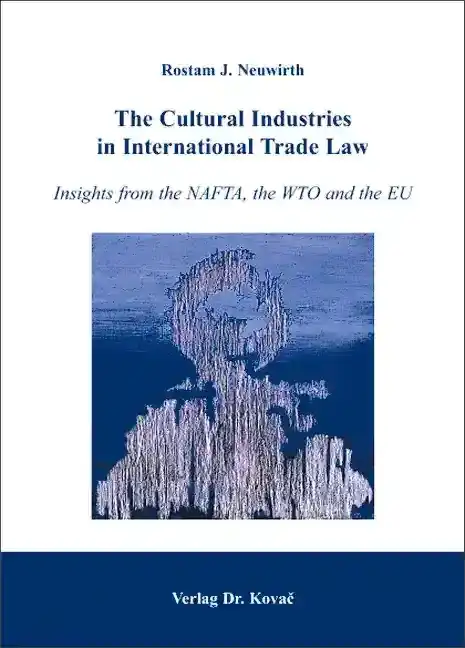Rostam J. NeuwirthThe Cultural Industries in International Trade Law
Insights from the NAFTA, the WTO and the EU
Studien zum Völker- und Europarecht, Band 31
Hamburg 2006, 600 Seiten
ISBN 978-3-8300-2535-1 (Print)
ISBN 978-3-339-02535-7 (eBook)
Zum Inhalt
The present book evaluates the present regulatory situation of various cultural goods and services, known as the cultural industries, under international trade law. Particularly, it looks at the experiences of the North American Free Trade Agreement (NAFTA) and the European Union (EU) in order to critically evaluate the efficiency and legitimacy of the current multilateral trading regime established under the aegis of the World Trade Organization (WTO).
In the past, the traditional regulatory approach to cultural goods (and services), especially in the then dominant category known as „cultural property?, was characterised by the assumption of the mutual exclusion of their economic and cultural aspects. This approach is reflected in the concept of res extra commercium, which describes a category of goods which cannot form the subject of commercial transactions. Only in the early 20th century, the emergence of a new category of cultural goods and services was inaugurated by revolutionary technological inventions in the field of cinematograph films and the transmission of signals via radio. Since then this new category, which was later denominated by the concept of culture industry, not only proves to pose a complex legal challenge to the regulation of international trade but also appears to provide a new paradigm for most of the challenges for the international community and their societies lying ahead in the future.
The evolution of the concept „culture industry?, from its origin amidst members of the Frankfurt School to its gradual transformation through intense contacts with various scientific disciplines into the concept of cultural industries, finally reached the legal sphere when it was first codified in the 1988 Canada-United States Free Trade Agreement (CUSFTA) and later on carried over to the North American Free Trade Agreement (NAFTA).
The book inquires more closely into the actual legal value of the cultural industries exemption in NAFTA as a corrective for the lack of cultural sensitivity within the area of economic integration regimes. It also analyses the legal significance and political mandate of Article IV GATT on cinematograph films, which serves as a point of departure for the evaluation of the situation of the cultural industries under the WTO legal regime, and notably the General Agreement on Tariffs and Trade (GATT), the General Agreement on Trade in Services (GATS) and the Agreement on Trade-Related Aspects of Intellectual Property Rights (TRIPS).
Following a critical review of the Canada Periodicals Case, which was decided by the WTO Appellate Body in 1997, and a short outlook at the expected legal impact of the recently adopted UNESCO Convention on the Protection and Promotion of the Diversity of Cultural Expressions (CDCE), light is cast on the cultural industries in the context of the process of European integration from the European Economic Community (EEC) to the EU and the Treaty Establishing a Constitution for Europe.
Based on the finding that in a diminishing spatial framework accompanied by greater economic interdependence, sooner or later cultural differences, or else cultural diversity, increase in importance as contact points multiply, the book concludes with some deliberations on the specificity inherent in the cultural goods and services comprised of the cultural industries. From this specificity, it is argued, derives the need for their special treatment and, most of all, for a more complementary approach to the respective areas of culture and trade in their mutual relation, which eventually can only be achieved through the improvement of the cooperation between the competent international organisations with a view of enhancing the unity and coherence of the international legal order.
Kontakt zum Autor
Ihr Werk im Verlag Dr. Kovač
Möchten Sie Ihre wissenschaftliche Arbeit publizieren? Erfahren Sie mehr über unsere günstigen Konditionen und unseren Service für Autorinnen und Autoren.
